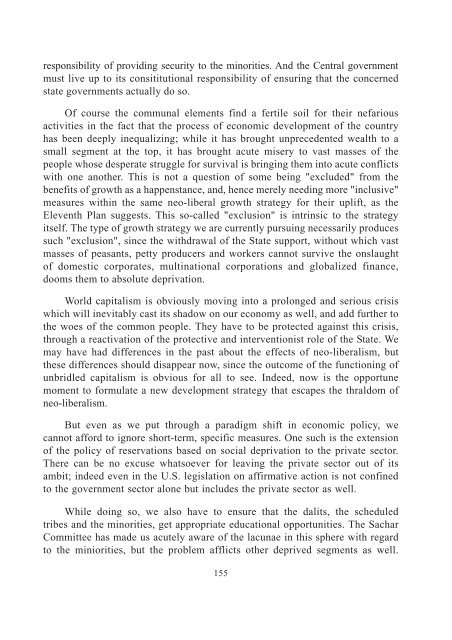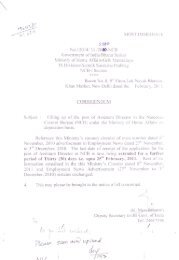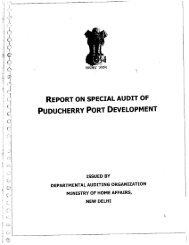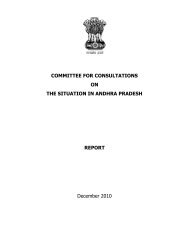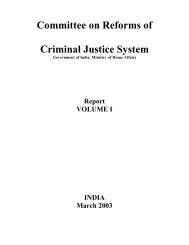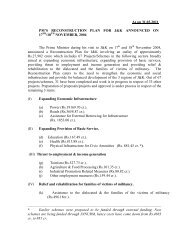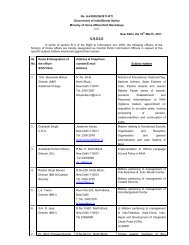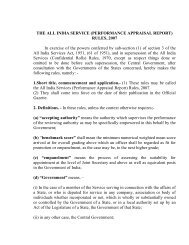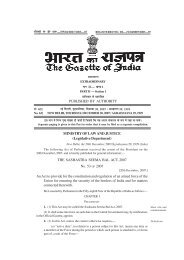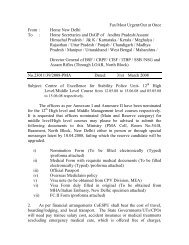Book of Integration Council New - Ministry of Home Affairs
Book of Integration Council New - Ministry of Home Affairs
Book of Integration Council New - Ministry of Home Affairs
You also want an ePaper? Increase the reach of your titles
YUMPU automatically turns print PDFs into web optimized ePapers that Google loves.
esponsibility <strong>of</strong> providing security to the minorities. And the Central government<br />
must live up to its consititutional responsibility <strong>of</strong> ensuring that the concerned<br />
state governments actually do so.<br />
Of course the communal elements find a fertile soil for their nefarious<br />
activities in the fact that the process <strong>of</strong> economic development <strong>of</strong> the country<br />
has been deeply inequalizing; while it has brought unprecedented wealth to a<br />
small segment at the top, it has brought acute misery to vast masses <strong>of</strong> the<br />
people whose desperate struggle for survival is bringing them into acute conflicts<br />
with one another. This is not a question <strong>of</strong> some being "excluded" from the<br />
benefits <strong>of</strong> growth as a happenstance, and, hence merely needing more "inclusive"<br />
measures within the same neo-liberal growth strategy for their uplift, as the<br />
Eleventh Plan suggests. This so-called "exclusion" is intrinsic to the strategy<br />
itself. The type <strong>of</strong> growth strategy we are currently pursuing necessarily produces<br />
such "exclusion", since the withdrawal <strong>of</strong> the State support, without which vast<br />
masses <strong>of</strong> peasants, petty producers and workers cannot survive the onslaught<br />
<strong>of</strong> domestic corporates, multinational corporations and globalized finance,<br />
dooms them to absolute deprivation.<br />
World capitalism is obviously moving into a prolonged and serious crisis<br />
which will inevitably cast its shadow on our economy as well, and add further to<br />
the woes <strong>of</strong> the common people. They have to be protected against this crisis,<br />
through a reactivation <strong>of</strong> the protective and interventionist role <strong>of</strong> the State. We<br />
may have had differences in the past about the effects <strong>of</strong> neo-liberalism, but<br />
these differences should disappear now, since the outcome <strong>of</strong> the functioning <strong>of</strong><br />
unbridled capitalism is obvious for all to see. Indeed, now is the opportune<br />
moment to formulate a new development strategy that escapes the thraldom <strong>of</strong><br />
neo-liberalism.<br />
But even as we put through a paradigm shift in economic policy, we<br />
cannot afford to ignore short-term, specific measures. One such is the extension<br />
<strong>of</strong> the policy <strong>of</strong> reservations based on social deprivation to the private sector.<br />
There can be no excuse whatsoever for leaving the private sector out <strong>of</strong> its<br />
ambit; indeed even in the U.S. legislation on affirmative action is not confined<br />
to the government sector alone but includes the private sector as well.<br />
While doing so, we also have to ensure that the dalits, the scheduled<br />
tribes and the minorities, get appropriate educational opportunities. The Sachar<br />
Committee has made us acutely aware <strong>of</strong> the lacunae in this sphere with regard<br />
to the miniorities, but the problem afflicts other deprived segments as well.<br />
155


